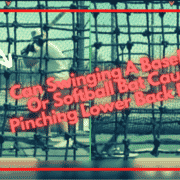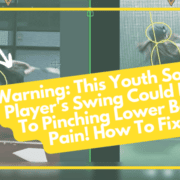Swinging A Baseball Or Softball Bat Pinching Lower Back Pain & Common 14 Year Old Youth Player Injuries | Spondylolysis, Sciatic Nerve, Stress Fracture, & Quadratus Lomborum
Discover swinging a baseball or softball bat pinching lower back pain exercises and common youth player injuries found in 14 year olds. Get exercise resources for Spondylolysis, Sciatic nerve, stress fracture, and Quadratus Lomborum.
Before taking any of the recommendations in this post, PLEASE consult with a board certified physician first if experiencing lower back pain – do the research beforehand. Physical Therapists, Chiropractors, Rolfers, and MAT professionals are a fantastic way to start. That being said, if the pain isn’t too bad and only occurs during or after swinging, which suggests mechanics may be at fault, then the recommendations in this post will help tremendously.
Derek Jeter: These Exercises Accelerate Swing Efficiency
I was recently introduced to Danilo Collins (pronounced Duh-nee-lo). A 16-year-old baseball player in Florida. Over email, he sent impact and follow through pictures (and video) of his swing, saying:
“Hey Joey, I have had this exact problem ever since I started filming my swing. During my final turn, at or near contact I find that my upper body tenses up. My shoulders shrug up, my face tenses up and tilts awkwardly, and my back arches in a weird, unnatural way.”
In this video blog, I want to address Danilo’s swing concerns using Derek Jeter as a model. We’ll answer these three questions:
- What does an efficient impact & follow through position look like?
- What can impact & follow through tell us about movement dysfunction?
- What exercises can a hitter do to correct this?
If we can get a hitter moving better, they’ll perform better. Movement dysfunction puts performance on the back burner. Let’s see how Derek Jeter’s swing compares…
SCIENCE-BASED TRAINING:
Improve your hitting strategy dramatically by applying human movement principles.
Learn not only how and what to train but also the science behind the methods.
What Does an Efficient Impact & Follow Through Position Look Like?
Last week, I posted this to my Facebook fan-page using Danilo and Derek Jeter’s impact pictures, and received great feedback:
[fb_embed_post href=”https://www.facebook.com/HittingPerformanceLab/posts/571869122942886/” width=”400″/]Here’s the jist of the Facebook feedback, in comparing Danilo to Derek Jeter:
- Batting tee is set too far back for true point of contact,
- Detachment of front arm from rib cage – no extension, and
- Too much focus on turning faster. By extending front arm at contact, then back arm after contact Danilo will increase his inertial force (CLICK HERE to see another blog post on this).
Those great Facebook comments aside, I want to focus on something else that most don’t…
What Can Impact & Follow Through Tell Us About Movement Dysfunction?
I feel fixing movement dysfunction is just as important as efficient swing mechanics. Without correction, the body loses the ability to move efficiently. This dramatically decreases batted ball distance. Here’s what to key in on at impact and follow through using Derek Jeter as a reference point:
- Maintaining strict alignment of head and spine (core stability), AND
- Staying low on the pitch plane using back leg (core stability & glute activation).
If we compare Danilo to Derek Jeter, we can see a huge difference in the back leg angle, and how well the head, rib cage, and pelvis stack on top of each other. When it comes to hitting mechanics my hitters work on the Hollow Pinch, which is pinching the hitter’s belt buckle and belly button together throughout the whole swing – even into finish. We did a swing experiment on that here.
What Exercises Can a Hitter Do to Correct This?
I mentioned Core Stability & Glute Activation. I want you to do something for me:
- Stand up with your feet under your shoulders,
- Squeeze your butt cheeks together as hard as you can (notice your pelvis change position?), and
- Now, tighten your abs as hard as you can like you’re doing a standing crunch (did this bring your rib-cage down?)
Danilo is arching his back and extending his back leg, resulting in his lower back taking on sheer forces. In the middle, taking a vacation, are his glutes. To look like Derek Jeter in the Impact and Follow Through photo to the right, Danilo will have to do these TWO corrective exercises 1-2 times daily:
- Hollow Body Hold (core stability) – week 1: 1 set X 20-30 secs hold, week two: 1 set X 30-40 secs hold, week three: 2 sets X 30 secs hold, and week four: 2 sets X 45 secs hold…do every other day.
- Super Plank (core stability) – week one: 1 set X 45 secs hold, week two: 1 set X 60 secs hold, week three: 2 sets X 45 secs hold, and week four: 2 sets X 60 secs hold.
- Single Leg Floor Bridge (glue activation) – week one: 1 set X 12 reps each leg, week two: 1 set X 15 reps each leg, week three: 2 sets X 12 reps each leg, and week four: 2 sets X 15 reps each leg.
The reps and time can change for younger hitters. Be sure to let the hips down slowly (4-secs) for each repetition for #2. After 4-weeks on #1, turn up the heat by doing a Super Plank-Pushup. Make sure to practice the same rules from the Super Plank. The key is NO rotation of the pelvis. You should be able to set a drink of water on the back of the pelvis when doing the movement, without spilling.
FINAL NOTE on Derek Jeter’s swing: we want head-spine alignment, but with a slight angle up and back over the catcher for more repeatable power. Derek Jeter is more vertical like Tony Gwynn.
- Fix Late Swings Fast: 2025 Pitch Recognition & See-Decide-Swing Training for Youth Baseball Power Hitters - October 6, 2025
- Safe Youth Weighted Bat Training: Proven Overload/Underload Drills to Increase Exit Velocity in Games Starting Tonight - September 29, 2025
- AI Coaching Course 2025: Youth Baseball & Softball Practice Plan + Off-Season & In-Season Workout Builder Fast - September 23, 2025








Loving it!!!
Making me a believer!
Keep up the good work!!!
Jeff, glad you’re liking this stuff. It’s what I’ve been doing with all my hitters. Some sort of corrective movement. Sometimes, it could be a stiff ankle or hip that we need to mobilize. But it all counts the same when talking about explosive human movement.
Joey… What aspect in the launch part of the swing creates the high lead elbow seen in the contact position? In other words, what would make the lead elbow go to the hip at contact and what would make the lead elbow go too high?
Kyle
Kyle: good question. This compensation can be caused by a number of things happening before. Lead elbow up or down can be a timing thing. It could be that the player has been exposed to strict rotational style hitting. Hands inside the ball approaches. It could even be a last minute adjustment the arms are making to the incoming pitch. It’s hard to say really, unless we can see the actual swing under slow motion analysis.